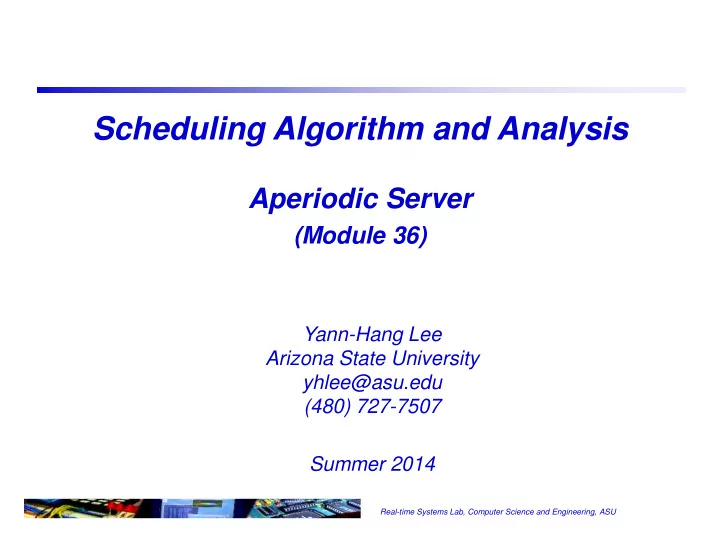

Scheduling Algorithm and Analysis Aperiodic Server (Module 36) Yann-Hang Lee Arizona State University yhlee@asu.edu (480) 727-7507 Summer 2014 Real-time Systems Lab, Computer Science and Engineering, ASU
Scheduling Aperiodic/Sporadic Tasks Assumptions: Preemptive, priority-driven algorithms Jobs independent of one another with arbitrary interrelease times Periodic Jobs parameters and priority driven algorithm given on their own, periodic jobs meet all deadlines Aperiodic Jobs parameters not necessarily known on release Sporadic Parameters known on release variable execution time arbitrary deadline 1 Real-time Systems Lab, Computer Science and Engineering, ASU
Scheduling Architecture for Aperiodic Tasks Aperiodic, Sporadic scheduling algorithms: all periodic tasks meet their deadlines Sporadic jobs: on arrival, undergo acceptance test. Must not affect periodic jobs and already accepted sporadic jobs. Aperiodic jobs: Optimize response time (average) without affecting periodic and accepted sporadic jobs Periodic Jobs Aperiodic Jobs Dispatcher Processor dispatch highest Accept Acceptance priority job Sporadic Jobs Test Priority Queues Reject 2 Real-time Systems Lab, Computer Science and Engineering, ASU
Approaches: Aperiodic Background: scheduled when processor is idle Interrupt-driven: scheduled on arrival Periodic server: defined by ( p s , e s ). Budget replenished at p s intervals. If scheduled and queue empty then budget set to 0. Bandwidth-preserving server: Improves on the periodic server by preserving budget (bandwidth) when aperiodic queue is empty: Deferrable servers Sporadic Server Constant utilization and Total bandwidth servers 3 Real-time Systems Lab, Computer Science and Engineering, ASU
Example of a Polling Server T 1 T 2 T a T 3 To prove it works the polling server is periodic and has a WCET of e s When the polling server is eligible and there is no aperiodic task the budget is lost Combine with a background server 4 Real-time Systems Lab, Computer Science and Engineering, ASU
Aperiodic Servers A service thread waiting for the external trigger(s) fixed execution budget replenishment interval (period) Can be compared to periodic tasks if it is ready, run according to priority scheduling scheme Priority adjusted to meet requirements Issues: How to reserve the bandwidth when no aperiodic task exists how to replenish the budget. Example: Polling server no bandwidth preserving fixed replenishment time 5 Real-time Systems Lab, Computer Science and Engineering, ASU
Deferrable Server A periodic server task is created. When the server is invoked with no outstanding aperiodic tasks, the server does not execute but defers its assigned time slot. When an aperiodic task arrives, the server is invoked to execute aperiodic tasks and maintains its priority. Unlike the priority exchange policy, the server’s time is preserved at its initial priority. The computation time allowance for the server is replenished at the start of its period. Provides better response time for aperiodic tasks than Polling server 6 Real-time Systems Lab, Computer Science and Engineering, ASU
Deferrable Server (DS) Periodic task ( p s , e s ) model with rules: budget consumed only when executing budget replenished at kp s , budget = e s at kp s T 1 T 2 T a budget T 3 7 Real-time Systems Lab, Computer Science and Engineering, ASU
Sporadic Servers The deferrable server has this one additional preemption and reduces the schedulability of periodic tasks. Vary the points at which the computation time of the server is replenished, rather than merely at the start of each period. allows to enhance the average response time for aperiodic tasks without degrading the utilization bound for periodic tasks any spare capacity (i.e., not being used by periodic tasks) is available for an aperiodic task on its arrival Sporadic server ( p s , e s ) does not demand more processor time than a periodic task with the same parameters 5 5 5 Execution budget 100 200 300 5 5 100 ms 100 ms (SS period) 8 Real-time Systems Lab, Computer Science and Engineering, ASU
Supplementary Slides Real-time Systems Lab, Computer Science and Engineering, ASU
Recommend
More recommend